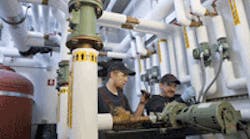Latest from Business Development
eBook: Building Your Plumbing Business Brand
Sponsored
A handful of contractors are reporting a steady stream of commercial jobs early in the year, but some say that trend may not be consistent in what has proven to be a tumultuous economy thus far.
One part of the country that appears to be weathering the building construction storm is Anchorage, Alaska, which recorded about $626.3 million in overall valuation of building permits last year, making 2007 among the top 10 years for construction in the state.
Commercial permit valuation for 2007 was about $461.7 million, marking the fourth highest year ever for Anchorage commercial construction projects, according to the municipality.
One contractor benefiting from this success is Anchorage-based KLEBS.
“Our economy in Alaska is probably going at a little better pace than the lower 48,” said Gary Klebs, the company's president. “We're not as strong as we were in other years, but we're still in a growth mode and that's good for us. We've had 19 or 20 years of our economy being all in a positive growth, and that's a long time.”
The contractor, which specializes in fabrication, installation and servicing of commercial and residential HVAC systems, also currently has about 25 commercial plumbing projects on the books.
“It's good any time you can have that many projects going on this time of year,” Klebs said. “The weather certainly prohibits or at least slows down any new buildings going up, but we're busy this time of year, and that's really a good sign. That means that we're doing things right.”
Target comes to Alaska
One of the contractor's largest projects is the state's first Target store in Wasilla, which is about 60 miles north of Anchorage, said Mike Klebs, the company's commercial division manager.
KLEBS is installing the underground plumbing for the store's restrooms as well as case drains for its produce area and coolers. In addition, the contractor is providing the store's roof drainage system, which calls for 10-in. rain leader PVC piping.
The company's scope of work includes the installation of 16 packaged rooftop units, six exhaust fans, ductwork and diffusers for the store's HVAC system.
Being located in Alaska, the store also will feature a snowmelt system for its front sidewalk, according to Mike Klebs.
“We actually had to put a couple of boilers in with a hydronic system for that snowmelt area out front,” he said.
When completed, the 172,000-sq.-ft. Target store will act as one of the anchors of the $100 million Tikahtnu Commons retail and entertainment center. Overall, Tikahtnu Commons will feature 12 to 15 large stores and 60 to 75 small retail stores and restaurants.
KLEBS also is working on an expansion project at the Eagle River Wal-Mart in northeast Anchorage. The company is installing an entirely new drainage system to accommodate the store's grocery area, deli, bakery and associated cases, Klebs said.
The $1.3 million project includes the installation of 28 new heating and cooling rooftop units, exhaust fans, ductwork and grilles and diffusers.
“It's a complex project in the sense that you don't want to upset the existing store's operations, or at least minimize that disruption,” Klebs said.
In addition to its large-scale commercial projects, KLEBS received an $800,000 contract to replace all of the domestic cold and hot water recirculation piping mains at the U.S. Federal Building and Courthouse in Anchorage.
KLEBS will replace the facility's current galvanized piping, which ranges in size from 8-in. to ¾-in., with copper piping. The building houses Federal Aviation Administration, congressional and court offices as well as federal courtrooms.
Klebs said he expects his company to remain busy throughout the first quarter of the year before business begins tailing off.
“All of our guys are busy, which has been kind of different from five to eight years ago when you'd hit the January, February, March months and everybody would just kind of lay off and slow down and there wouldn't be any work,” he said.
Diversity a must
By contrast, Chicago-based contractor Winters Heating and Air Conditioning has had to downsize slightly to weather the economic downturn, according to Ted Winters, the company's sales engineer.
“There was a time when we did upwards of $4 million in sales. We're probably down to half of that or less right now,” Winters said. “I've been in the heating business for 30-some years and this is the worst I've ever seen it. Anyone who has all of his eggs in one basket is dying on the vine right now.”
With the nation's economy being as it is right now, Winters said his firm is very particular about the types of projects it accepts.
“We don't work for anybody without a good payment history or a good knowledge of management,” he said. “I've been through the gamut of taking every job that I'm awarded and it's just disastrous because the people who are doing it don't know how to manage the job.”
For the time being, the firm has found success installing heating and cooling systems for mid-rise condominiums in suburban Chicago. Winters said the condos are popular with baby-boomers who have either sold or are selling their current homes and who are not looking for a mortgage.
The company recently installed the heating and cooling system for a 36-unit condominium in the suburb of Arlington Heights and is under way on a similar job at a condo complex in the upscale community of Lincolnshire.
The two-stage heating systems feature perimeter radiant heat with 200- to 250-ft. of ½-in. radiant tubing in each condominium and boilers controlled by an outdoor reset.
In addition, the contractor will supply heating and cooling for an 80-unit building with retail space in the suburb of Vernon Hills. With new residential construction being “basically non-existent,” Winters said he is glad to have these jobs come his way.
“I feel fortunate to have the work I have. Everyone I talk to out there who does this same kind of work, they're just sitting,” he said.
Others in the industry share that sentiment as well.
New Mexico slows
Michael Gonzales, mechanical group vice president for Sundance Mechanical and Utility Corp., Albuquerque, N.M., said his firm is starting off the year well, but he projects that business eventually will slow.
“Indications are it's not going to be as busy as it was last year,” he said.
Currently, Sundance Mechanical is providing plumbing and water source heat pump systems for jobs at the University of Phoenix and Farm Credit of New Mexico, Gonzales said. The firm also has projects lined up to install standard heating and cooling systems for the New Mexico Cancer Center and a 19,500-sq.-ft. addition to the Ronald McDonald House for the Ronald McDonald House Charities of New Mexico.
“We try to work on about 20 to 30 projects at a time, but as the year goes on, I see that number declining,” Gonzales said. “Instead of having 20 jobs going on, we might only have 10. It's more of a yearly volume thing than number of jobs. There just aren't the number of projects out to bid as there used to be.”
Back in Anchorage, Mike Cooke, manager of plumbing operations for Partusch Plumbing and Heating, worries about what will happen when the number of existing jobs dries up.
“Like most of the country, it's going to turn into nothing pretty soon,” Cooke said. “I hate to say that, but the doom and gloom is looking pretty true. We get updates weekly here in Anchorage, and there have not been any brand new commercial permits pulled in the last month. It's terrible.”
Being one of the largest residential plumbing contractors in south central Alaska, Cooke said his firm is lucky to have the few available residential projects. The firm specializes in residential and multi-family new construction and has completed projects ranging from one unit to more than 200 units.
Cooke said his company is about one-third of the way through a project to provide plumbing for a three-story, 30-unit residential complex being built by the Peterson Group.
The firm also is doing the plumbing for an 80-unit mixed-income housing development on eight acres operated by Cook Inlet Housing Authority. The development, Grass Creek Village at the Creekside Town Center, will feature 22 triplex and fourplex buildings.
“I'm glad we have these jobs,” Cooke said. “The housing market here, just like the rest of the country, is extremely weak right now. A lot of the big commercial projects are finishing up too, so all of the trades are in a quandary as to what is going to happen this year. It worries everybody.”


